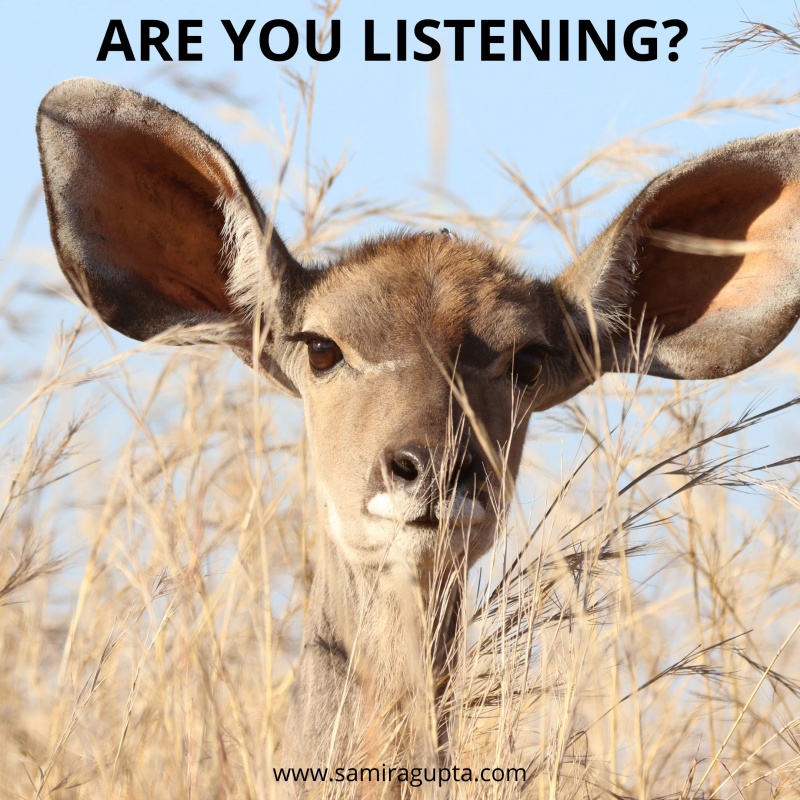Listening 101 – your blueprint to great conversations

October 17, 2020
“Are you even listening to me?”, “Are you with us?”, or “Is your mind somewhere else?”, how many times have you heard these in a classroom or business? The answer might be “Many”. The reason being is that these days listening is considered as a reflex action. But then the question arises - Do we have to convince people of listening? Is there a way to convey it? Is there some formula to be attentive about everything and anything that’s happening around us? Well, there might be.
Being in the corporate world, I have noticed and understood that listening is essential. Though over the years listening in the field of business has developed, it still serves as the prime element to become a good leader.
Six elements that’ll help you ‘learn to listen’
- Listening and hearing are different: Where hearing simply is an ability to hear with your ears, listening involves the use of your brain. It’s about keeping your brain focused on what the other person is speaking.
- Willingness: Whenever there’s a conversation, be keen about it as it gives the speaker a sense of trust and honesty.
- Be consistent: Listening can be a difficult task to master, but if you are consistent with it and practice regularly, there’s no stopping.
- Be attentive: To be attentive, you must hone active listening skill as it helps you give undivided attention and keeps you engaged in a conversation.
- Live in the moment: Instead of predicting the next word, focus on the current. Be an active listener, to understand what the person has to say, and it’ll help you respond better.
- Keep your ego aside and respect: Whether a junior or a senior, every person talking to you needs to be respected. So, keep your thoughts and ego aside as they have also done the same for you.
How can you enhance your listening skills practically?
- Listen. Write. Repeat.
The best and foremost way to practice listening is by carefully listening to a podcast or audio. At first, you might not be able to remember all of it, but at least try to get a gist of what’s being said. Then write down what you have understood or the words you remember. Now, plug in your earphones again, listen to the same audio, and again write down the words. Keep repeating the process for at least 3 times. You’ll notice that with every step, the number of words will increase, and in the end, when you hear it for the final time, you’ll see that your summary matches the 80%-90% audio. This will prepare you to become an active listener. - Listen to your kids
Small kids have dozens of questions and to become a good listener all you have to do is be available to answer these questions. Respond to all their questions in real-time. It will help you become an active listener and also a quick responder. - Record a conversation
If you’re talking to your friend, try to record the conversation without impeding the privacy, and listen to it later. The idea here is to understand how much you have listened and how much you have engaged in the conversation. The ideal rate should be 80:20.
How to hone the listening skill?
- Know the intent
We listen because we have a purpose and as a good listener you must know it beforehand. Understand the environment of the conversation – time, place, topics, situation. Keep track of your attitude and actions as they might flow with the conversation. Doing so, you will notice you’re making a flawless conversation without any fillers. - Ask yourself
All the answers you are seeking are hidden within you. Before you involve yourself in a conversation and regret, ask yourself - why do you wish to listen to it? Is it to understand, or it’sjust a reaction? Is it the talk of empathy or a solution to the problem, etc. If you know why you’re engaging, you’ll see responses fall in place. - Enjoy the company of silence
Many times, it happens that after a conversation, there’s sudden silence in the room. Don’t rush into it and start another conversation. Instead, get comfortable with it. - Know the mood
Gather information about another person’s mood, motive, energy, emotion by listening car style="margin-bottom: 12px;"efully, and when your time comes, respond to their needs. - Be curious
The best way to keep a conversation alive is by asking questions as it symbolises your curiosity about the topic, and makes another person believe in you. - Know when to stop
When you part of listening is done, you must respond, but it’s also necessary to understand when you should stop. Endless talking from your end can bore the listener, and there wouldn’t be a two-way conversation. Listening can be of great joy when you can connect with each other, and the best way to connect is to listen. Listen carefully, talk wisely, and connect with many!
About the author
Samira Gupta is a Coach, Consultant, Speaker and Author, with over 22 years of experience in the corporate world and over 7 years in corporate training, executive presence coaching and image consulting. She aims to bring about a 360° transformation in her client’s lives.
Contact details: +91 9958934766 / www.auraaimage.com / samira@auraaimage.com